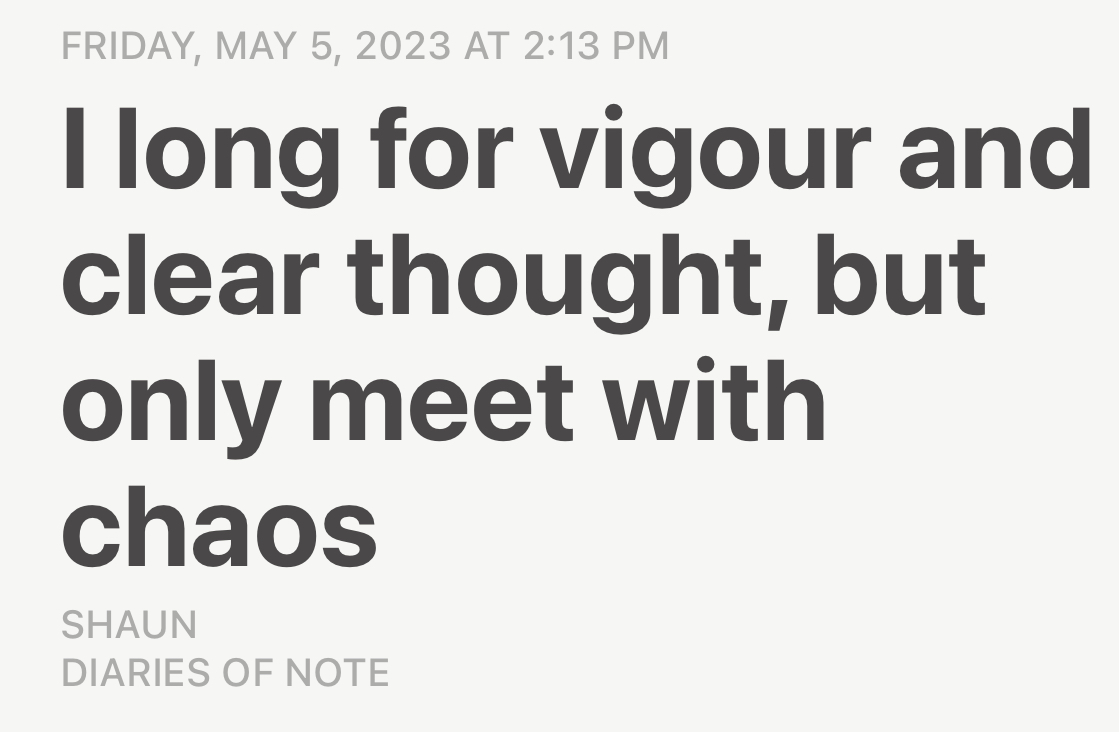without principle
‘The Godfather of AI’ Quits Google and Warns of Danger Ahead:
Dr. Hinton said that when people used to ask him how he could work on technology that was potentially dangerous, he would paraphrase Robert Oppenheimer, who led the U.S. effort to build the atomic bomb: “When you see something that is technically sweet, you go ahead and do it.”
He does not say that anymore.
As someone who has been writing for some years now about what I call the Oppenheimer Principle, I find this moment piquant.
But I was also troubled by President Biden’s Grandpa Joe moment when he wandered into a meeting between the Vice-President and the nation’s leading professional sociopaths and then asked those sociopaths to “educate us.” Ah well. It could be worse, and we all know how it could be worse.
same

The list of musical cues in Malick’s Song to Song is hilarious and wonderful.
cosplaying Kingship
In a much-celebrated essay on King Lear, Stephen Greenblatt writes about theatrical costumes:
During the Reformation Catholic clerical garments – the copes and albs and amices and stoles that were the glories of medieval textile crafts – were sold to the players. An actor in a history play taking the part of an English bishop could conceivably have worn the actual robes of the character he was representing. Far more than thrift is involved here. The transmigration of a single ecclesiastical cloak from the vestry to the wardrobe may stand as an emblem of the more complex and elusive institutional exchanges that are my subject: a sacred sign, designed to be displayed before a crowd of men and women, is emptied, made negotiable, traded from one institution to another. Such exchanges are rarely so tangible; they are not usually registered in inventories, not often sealed with a cash payment. Nonetheless they occur constantly, for through institutional negotiation and exchange differentiated expressive systems, distinct cultural discourses, are fashioned.
What happens when the piece of cloth is passed from the Church to the playhouse? A consecrated object is reclassified, assigned a cash value, transferred from a sacred to a profane setting, deemed suitable for the stage. The theater company is willing to pay for the object not because it contributes to naturalistic representation but because it still bears a symbolic value, however attenuated. On the bare Elizabethan stage costumes were particularly important – companies were willing to pay more for a good costume than for a good play – and that importance in turn reflected the culture’s fetishistic obsession with clothes as a mark of status and degree.
The coronation of Queen Elizabeth II was a genuinely sacral occasion; the coronation of her son will be a theatrical one. The regalia of sacred Christian kingship has been sold to the players — because they, and their international television audience, are the only ones interested.
But perhaps, through the scrim of spectacle and costume, some observers will catch a glimpse of what the whole business once meant, a brief vision of something I’ve written about occasionally here: the deep human longing for a righteous anointed King.
P.S. This “deep human longing for a righteous anointed King” is central to my argument for anarchism. But an explanation of that will have to wait for another day.
P.P.S. After the ceremony: Some of my English friends are telling me that I was too cynical in the above. I hereby repent.
We do a lot of clerical labor to register ourselves with entities that have figured out ways to intervene in matters that were once direct and straightforward. For example, you have to download the Parkmobile app and set up an account before you can park your car in Santa Cruz, if you are anywhere near the boardwalk. Maybe you are ready to unwind on the beach after a hard day, or maybe you have a carload of kids with low blood sugar, two of whom desperately need to find a bathroom. But you are going to have to find a cell signal, register your credit card and make a password before you can go on your way. Of course, since the app freezes during the final step, you’re not sure you really did pay for parking, or if instead you will be paying an $85 parking ticket at some point in the future. It’s super relaxing. Ask me how I know.
If you don’t have a smart phone, you are out of luck. You may be paying taxes to maintain the street but you can’t park on it, since you are not quite a full citizen.
This story idealized detachment, “liberation” from mutual care, ensuring that relationships never came before career goals. It looked like bringing a capitalist mindset into our interactions, making it normal to use, discard, and objectify other people. And as they often do, our rapacious markets and short-term desires won out.
My second question is: Cui bono? Whom did this new story serve? Who benefits from a world of consequence-free sex, weak ties, the putting off of childbearing and family? Today, the pharmaceutical and medical industries benefit, by selling decades-long prescriptions for contraceptives, and then various attempts at ART later on. Corporations and employers benefit: they gain a new labor force unsaddled by commitments to family, place, or other less-than-profitable concerns.
(Intrinsic in Rethinking Sex’s critique of modern feminism’s dependence on contraception is a critique of the free-market values that many who would term themselves conservatives or reactionaries still—oddly to my mind—hold dear.)
A thousand times Yes. See also my description of the three governing axioms of our dominant discourse about gender. And as Mary Harrington says, this dominant understanding, this metaphysical capitalism, “views ‘freedom’ as best served by reframing embodied men and women as atomized, de-sexed, fungible, and interchangeable ‘humans’ composed of disembodied ‘identity’ plus body parts that can be reordered at will, like meat LEGOs.”
Why millennial men are turning to the Book of Common Prayer. Very cool! And if they’d like to know more about the book’s history, I can help.
Tim Keller: “If the Church aims at loving service to one’s neighbor while clearly speaking the truth, it will grow again and may have cultural influence. But if it aims at influence rather than humble service, it will have neither.”
Re: those two recent links: TV and movie writers fear that their employers want to outsource writing to AI; meanwhile, other writers seem to hate their work. Maybe we can work out a deal so the people who want to be replaced by AI can be. (BTW, I wrote about writers hating writing a while back.)
I eagerly co-sign this from Freddie: “So why write if you hate writing? … But you could do literally anything else, if you dislike the process so much. Or you could write, as an amateur or a professional, and join a noble enterprise that’s as almost as old as civilization. If you do that, why not try and enjoy it a little bit?”
Tim Carmody: “A writer in 2023 is disproportionately likely to be working on a script for a giant company that treats their output as a vanishingly small data point to plug into the attention factory. Why wouldn’t they be anxious?”
Emerging

Baldur Bjarnason: “Believing the myth of Artificial General Intelligence makes you incapable of understanding what language models today are and how they work.”
Currently listening 🎵

Richard Gibson: “Current debates about writing machines are not as fresh as they seem. As the footnotes of scientific papers quietly admit, much of the intellectual infrastructure of today’s advances was laid decades ago. Already in the 1940s, the mathematician Claude Shannon demonstrated that language use could be both described by statistics and imitated with statistics, whether those statistics were in human heads or a machine’s memory. As word got out about Shannon’s work, engineers and then artists tinkered with his ideas, wrote essays in which they mulled a future in which machines would write alongside us, and built the first (stuttering) generation of natural language generators. These were the first residents of the headspace into which so many of us have recently wandered.”

Currently reading: The Spirit of Early Christian Thought by Robert Louis Wilken. Another re-read. Very excited to return to this one. 📚
I want to move to the desert just to escape the leaf blowers.


